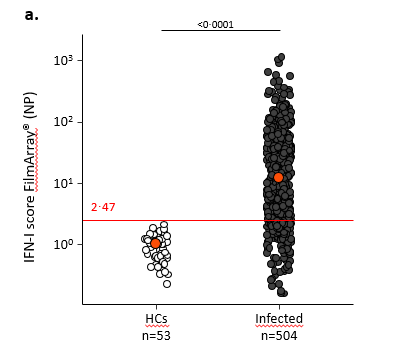Objective 1: Diagnosis
The first objective of the Chair is to confirm that the type I interferon score serves as a universal marker for respiratory viral infections. To achieve this, the Hospices Civils de Lyon will collect 1,000 nasopharyngeal swabs from hospitalized patients, on which the performance of this new IFN-I test for diagnosing viral infections will be evaluated. In order to be exhaustive on viral infections, similar studies will be conducted on three other continents: Africa, South America, and Southeast Asia. This will help confirm the universal applicability of the marker.
The ability of the IFN-I score to distinguish active viral infections (i.e., replicative infections) will also be tested in this research phase. Using the samples collected from HCLs, we will determine a threshold response to IFN in nasopharyngeal swabs that reflects the replicative nature of the current infection. This threshold can be further refined through ex vivo methods, such as exposing human respiratory epithelium to inactivated viruses (via thermal inactivation or UV treatment).
Results
The RESPIFERON study demonstrated the discriminatory capacity of the type-I interferon score. For this, 788 nasopharyngeal samples were collected collected from patients suspected of RVIs during their hospital stay at the Hospices Civils de Lyon and sent to routine virological laboratory for virological diagnosis. Among the samples positive for viruses targeted by first-line tests (RSV, SARS-CoV-2, and influenza), a strong discriminative ability of the type I Interferon score to differentiate viral respiratory samples from non-infected ones was reported (AUC = 0.92).
Moreover, out of the 284 NPS negative with first-line PCR tests, suspicion of viral infection according to IFN-I score was found in 63% of cases (178/284). Second-line test (BioFire® Respiratory Panel 2.1 plus) and viral metagenomic confirmed the presence of viruses 94% of cases. This highlights the potential of the IFN-I score to improve the documentation of respiratory viral infections and to refine the use of viral metagenomics for the detection of emerging or re-emerging viruses.
The results of the RESPIFERON study were published in the journal eBioMedicine, in the article entitled “Advancing Respiratory Virus Diagnostics: Integrating the Nasal IFN-I Score for Improved Viral Detection”.
- Mommert-Tripon et al., « Advancing respiratory virus diagnostics: integrating the nasal IFN-I score for improved viral detection », eBioMedicine, vol. 110, p. 105450, déc. 2024, doi: 10.1016/j.ebiom.2024.105450

